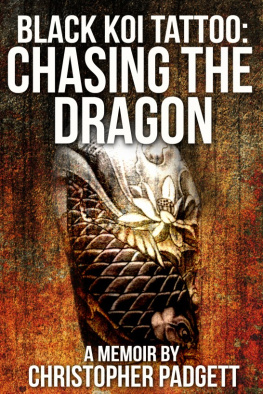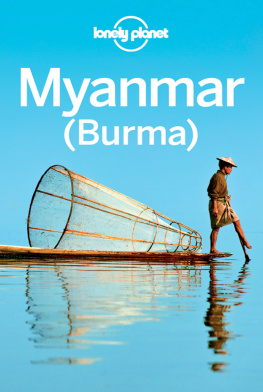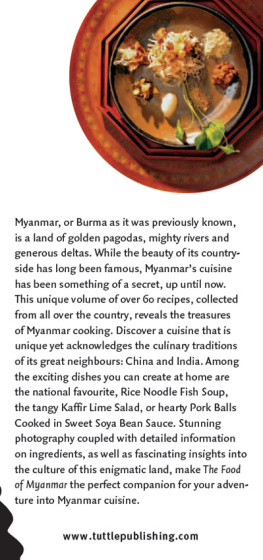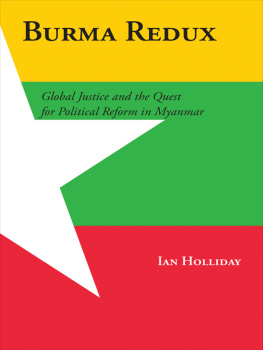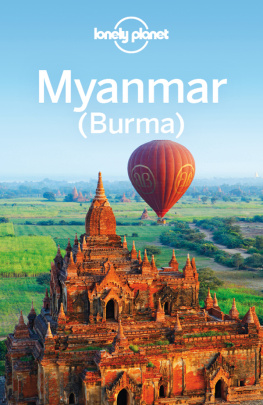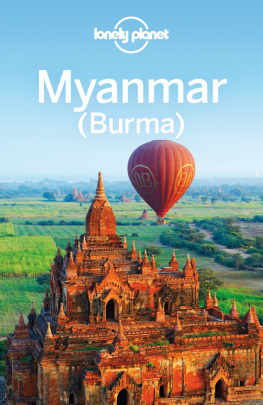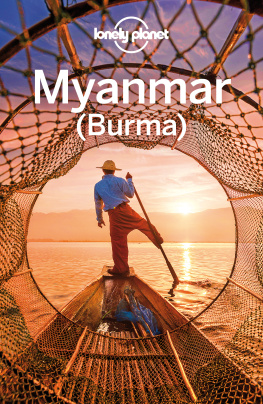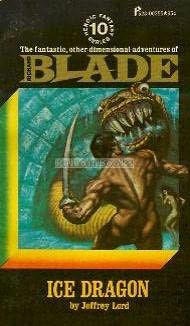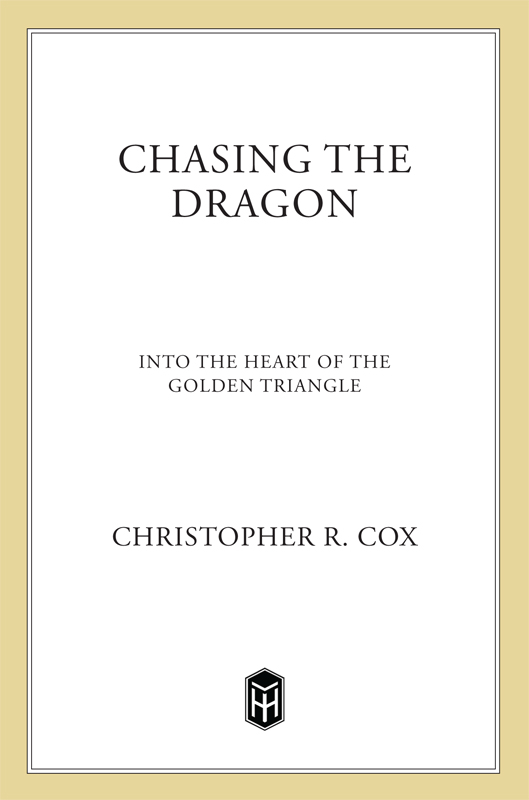Contents
Guide

The author and publisher have provided this e-book to you for your personal use only. You may not make this e-book publicly available in any way. Copyright infringement is against the law. If you believe the copy of this e-book you are reading infringes on the authors copyright, please notify the publisher at: us.macmillanusa.com/piracy.
C ONTENTS
To my parents,
Gerald and Nancy,
for the gift of wanderlust
and to my wife, Maria,
for granting the visa
Come not between the dragon and his wrath.
SHAKESPEARE , KING LEAR , I , i, 124
A great mans sword is never blunt.
BURMESE PROVERB


P ROLOGUE
The hilltribe women back slowly through the sloping fields. Bulbs the size of birds eggs sway atop vein-thin, chest-high stalks, dancing in the soft highland breeze like tentacles of a poisonous sea anemone. In the late-morning glare, the women work carefully, mindful of their harvests value. The earth is soft and warm beneath their feet, which rustle the dead ruby-and amethyst-colored petals blanketing the mountainside.
Wielding curved, tri-bladed knives as sharp as an eagles talons, they gently pinch the poppy pods between thumbs and forefingers and make quick, vertical incisions. In the heat of a brass-brilliant winter sun, tears of chalk-white sap soon well in the shallow cuts. Opium. The latex will ooze during the day; the droplets will coagulate and darken overnight. The next morning, while it is still cool, the women will return to painstakingly scrape the henna-colored gum from the pods with semicircular blades, then deposit the treasure into metal cans hanging from their necks like amulets.
This year, the spirits have smiled upon their mountain village. The earth the menfolk ate the previous spring to test its quality had been sweet with alkaline. A good place to burn the forest for the mineral-rich ash. The summer monsoon watered the cover crop of maize; autumn, dry and cool, was perfect for the poppy seedlings. The women descend through the fields. Gradually, their metal cans grow heavy with the weight of the blackened beads that bring both dreams and despair. Beneath their burden, the women smile. There will be opium enough to barter for salt, sugar, tobacco, and cloth. They know not where the opium goes, only that it brings merchants to their distant huts, that the fruit of their fields is coveted by the powerful men whose soldiers walk the dragon-toothed mountains. They know their hard, simple life will endure another year. Their ancestors knew the same rituals, endured the same risks, kowtowed to the same unseen, omnipotent warlords. It has always been thus in a land as wild as the waves of a raging typhoon.
* * *
In January 1996, Khun Sa, the most powerful, most infamous warlord in this lawless region, announced he had peacefully relinquished his control of the opium trade to become a private citizen and legitimate businessman. The following account is of a series of journeys through the shadowlands of the Golden Triangle on the eve of Khun Sas retirement.
Boston, Massachusetts
June 1996
Objective, Burma!
The night brought no dreams. There was only an infuriating half-sleep, with the promise of relief dangling just beyond reach, like a precious jewel. Twelve thousand miles of air travel, one dozen time zones crammed into five flights over two days, had created a chasm of anxiety spanned only by a few frayed nerves.
Mae Hong Son, Thailand, at three oclock in the morning of March 2, 1994or was it three in the afternoon of March 1? A hotel candle glowed in an opalescent pool of its own warm, milt-colored wax. Its shrine-like light bathed the Baiyoke Chalets teakwood paneling and the cheap nightstand heaped with cracker boxes and a trio of amber, empty Singha beer bottles, a small offering to the god of jet-lagged travelers.
Must sleep. A quarter tab of Xanax would help. A half tab had been good for eight drooling hours between Detroit and Tokyo. Was that technically yesterday? The word would come at four oclock, the truck for the mule camp at five. Wed be saddled up and on the old smuggling trail before six. Any later and the Thai Border Patrol Police would have us. Tomorrow night the sleep would come. With effort, with luck, with a wad of Thai baht, tomorrow night would be spent in Burma, in the forbidden Shan State, inside the fortress of Khun Sa, the worlds most powerful druglord. Cant miss the word. No Xanax, not even a bump. Not for the world. The King of Opium waited for no one.
I should have slept like a drugged Romantic poet. I had stumbled through the day, a somnambulist. The morning Thai Airways flight from Chiang Mai to Mae Hong Son had been canceledpoor visibility. It happened every spring in Mae Hong Son, this distant town in northwestern Thailand whose civic boosters had nicknamed The City above the Clouds. A more truthful slogan would have been The City Obscured by Clouds. The persistent mountain fogs were now compounded by smoke and ash as nomadic hilltribesLisu, Lahu, Akha, and Hmongslashed and then burned the forest before planting crops of upland rice and maize, melons and gourds, barley and illegal opium poppies.
Finally, in the warm mid-afternoon, the ATR-72 turboprop was able to fly through the purplish haze. The 2,590-meter peak of Doi Inthanon, Thailands highest mountain, jutted like a South Seas island from the foamy surf of cirrus clouds and smoke from freshly set hilltribe swidden fires. On the sweeping, final approach, the twin-engine plane skirted forested summits, banked hard to port a few hundred yards from a temple-topped mountain, then bounced down the runway on the edge of town. Mae Hong Son: the last outpost of order and lawful authority, the last stoplight until Taunggyi, Burma, nearly two hundred miles to the northwest. In between lay bad country, the rugged, anarchic mountains of Shan State, one of the least known regions of one of the worlds most xenophobic nations. This was my ultimate destination: the land of opium dreams, where poppies bloomed on a thousand hillsides.
A one-stoplight town, Mae Hong Son was the drowsy seat of Thailands most remote province. Not until 1965 did a paved road connect Mae Hong Son with Chiang Mai. Even today, the two-hundred-mile drive over buckled, washed-out Highway 108, negotiating a thousand switchbacks while tempting head-on collisions around every blind curve, was not to be undertaken lightly. The forty-minute flight to get here had been bumpy, but less so than the poor roads would have been. And at 345 baht (less than $14) it had to rank among the worlds cheapest airfares.
My sidekick, Jay F. Sullivan, a corporate employeebenefits broker with an unquenchable thirst for adventure, and I had alighted in a trekkers mecca. There were elephants to ride through pristine forest and around impossibly scenic karstic massifs that erupted out of emerald-green paddy fields. Motorized dugouts carried farang, the all-purpose Thai term for foreigners, down the tea-colored Pai River to gawk at the Padaung women whose elongated necks were wrapped in and supported by brass coils. However, we had a business agenda to pursue, not a packaged-adventure tour. But first we needed to eat. We carbo-loaded a mound of pad thai at the Fern Restaurant, where trees sprouted through the boards of the raised, open-air deck. Keep it simple. Never drink the water and avoid the house specialties: grilled fatty pork, grilled tough beef, and fish maw spicy salad. The trail to Burma was not lined with Portosans.


